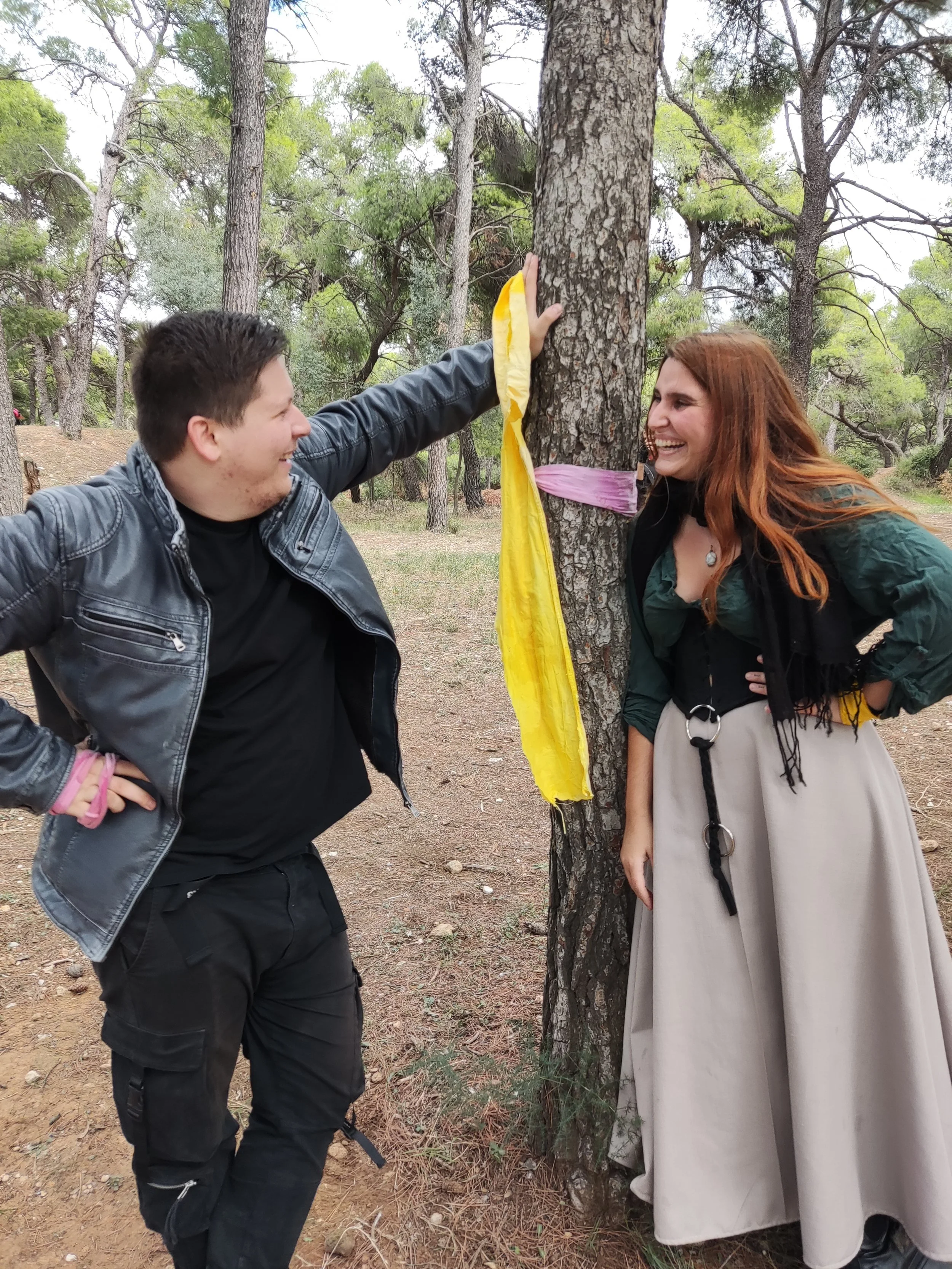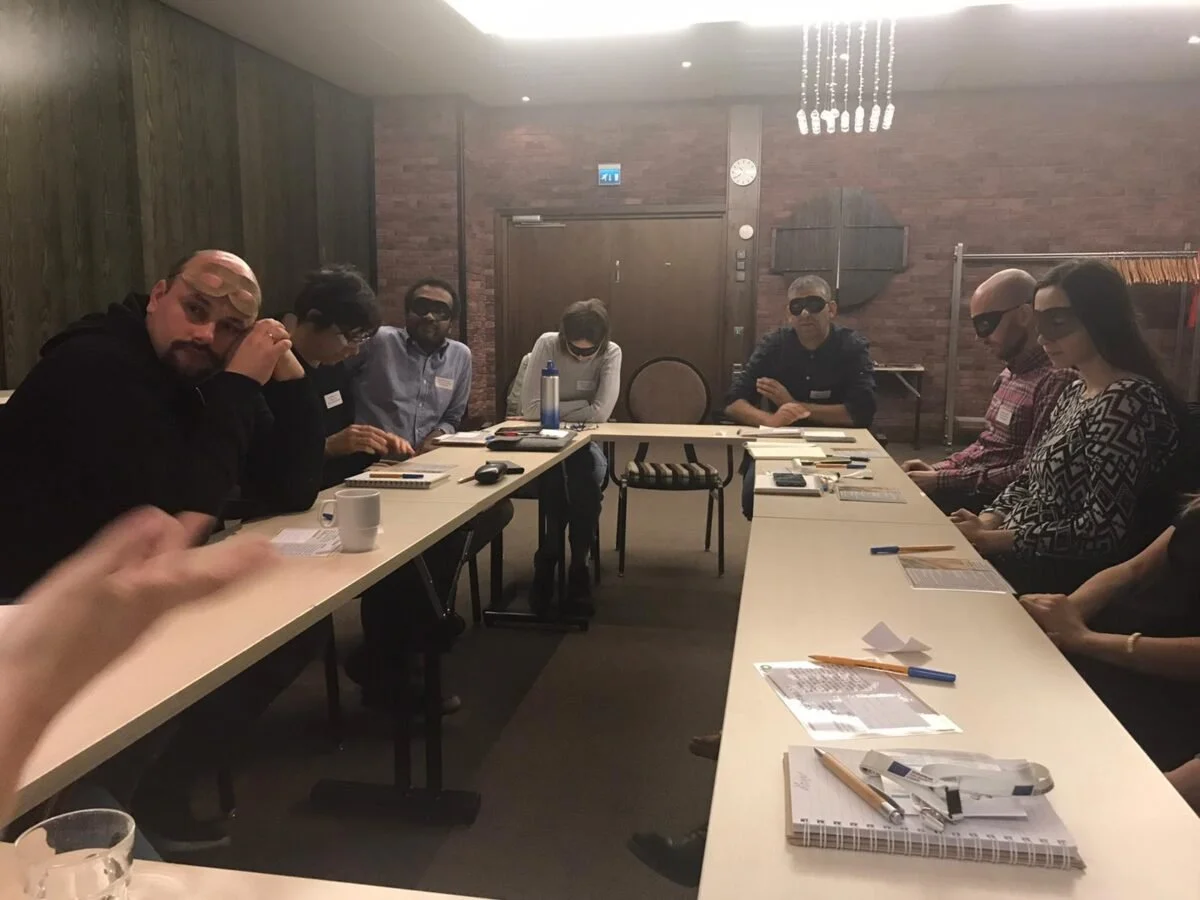Blog 3: Lessons learned from larps run at the Larpocracy Symposium
The three-day Larpocracy Symposium occurred over two months ago in Uppsala, Sweden.
In addition to the public launch, planning sessions, panels, presentations, and discussions, members conducted and participated in multiple larp and larp-adjacent arts works.
LARPifiers provided two experiences, The Reservoir and Council Chamber, and now share insight.
Exploring Design Practices: The Reservoir by Alexandros Alexiou
“During the Pan-Project Symposium which was held in Uppsala, we had some time to run a few games, in order to further dive into their concepts, discuss their practices, and reflect on their design. This text refers to the run of the larp game The Reservoir, developed by the LARPifiers.
The Reservoir is a larp game that was originally designed for climate education that is heavily reliant on a reflective debriefing process. During the Symposium run, the larp was introduced as a talking point; introducing members of the Symposium who are not yet involved with larps to the concept of an abstract larp, using guided debriefing as a method for fostering deliberation and experimenting with non-verbal larps as a design tool.
The game’s run was a very valuable knowledge transfer experience. The game introduces a heavy post-apoc setting in the framework of tribal survival, during which participants may not easily communicate, strategize, or cooperate, slowly building up frustration and radicalization. This setting allowed participants of the Symposium and the game run to set the ground for critical discussions.
They can be somewhat summarized in the following bullet points as a point for self-reflection over your own experiences, perhaps leading you, the reader, to get in touch with their own thoughts on the matter and draw your own conclusions.
● How often do we use conflict in design practices because of its appeal to audiences?
● (How) Can polarizing subjects help us facilitate deliberative processes?
● Does abstraction and non clear narratives help us create multi-faceted player experiences that create fertile ground for deliberative processes?
● Is larp alibi something that hinders or enhances our perception and reflective process?
● Is it possible to design larps that are fun mechanically while at their core engaging democratic processes?
● How do we create a larp that revolves around the human potential to nurture rather than harm?
● Design tools favor radicalization for building agendas and creating conflicting storylines and interactions - how do we do the same for deliberative processes?
● Is the spotlight on conflict and action so prevalent in the modern world that it affects our perception of what we expect from play?
● If yes, how can we still use that concept to foster deliberation?
Want to learn more about the game?
Here is the open source link to the Scenario. “
School Council by Elektra Diakolambrianou
"School Council was born in 2019, one October evening in Poland, at an Erasmus+ training organized by Europe4Youth. I casually went to my colleague Angie Bandhoesingh and said, 'Hey, remember that chamber larp about youth active participation that I wanted to write? Do you want to work on it together?'
In less than two days, the School Council was ready.
LARPifiers image - School Council, eduLARP on youth participation, presented and played at the International Tool Fair XIV in November 2019 in Rovaniemi, Finland
Now, of course, we are not magicians that pull edu-larps out of a hat. I already had a solid idea for the scenario and the learning objectives. Regarding the characters, I wanted to base them on profiles that had emerged from research on politicized collective identity that I had participated in as a social psychology PhD student at Panteion University.
Then Angie came up with the greatest idea: 'Why don't we repurpose the setting and characters we wrote for Superhero Union?'' Just a few months ago, together with our colleague Odysseus Dallas, we had written and run Superhero Union in edu-larp about the European Parliament Elections, funded by the European Cultural Foundation through the Action Grant Award Democracy Needs Imagination. So… putting all these elements together felt like creative cuisine: Gathering all the ingredients in front of you and brainstorming on how you can use and combine them to make a new recipe!
Just a month later, School Council made its debut in Finland at the SALTO International Tool Fair XIV in Rovaniemi. I run it for an international group of youth workers from Finland, Latvia, Italy, Bosnia, Poland, Cyprus, Egypt, and Slovakia. It received great feedback, which gave it the green light to continue its journey.
However, as we all know, a pandemic came upon us soon after that. Like many other elements of our lives, School Council had to migrate to the online space. As it can be easily run online, it became our go-to larp for the research we were conducting through the Erasmus+ strategic partnership project DiveIN—developing edu-larp methodology to prevent violent radicalization of young people, coordinated by Europe4Youth.
We had the pleasure of running it for Greek and international groups of players, with countries ranging from the UK to Venezuela. For quite some time, the initial run in Finland remained the only in-person run of the larp; when the lockdown was over, though, it traveled back to Poland to be run at the Erasmus+ youth exchange Into The Wild (again, organized by Europe4Youth, you guessed correctly).
When the time came to pack the School Council material in my suitcase to bring it to Uppsala and run it at the 1st Larpocracy Symposium, a smile came upon my face while remembering the first time I packed it to bring it to Rovaniemi. The superhero masks I was bringing this time were much better quality and fancier than the cheap ones I brought to Finland, but the rest of the material had hardly changed. And I’m not implying that the larp is so perfect that doesn’t require improvements. What I’m trying to say is that the social issues the larp brings up (diversity, lack of agency, environmental disasters, refugee influxes due to war, as well as all the factors that prevent youth from being motivated to be civically active) are still in 2025 as relevant as they were back in 2019.
I look forward to seeing what new adventures await School Council in the new chapter of its journey, in the Larpocracy project!”



